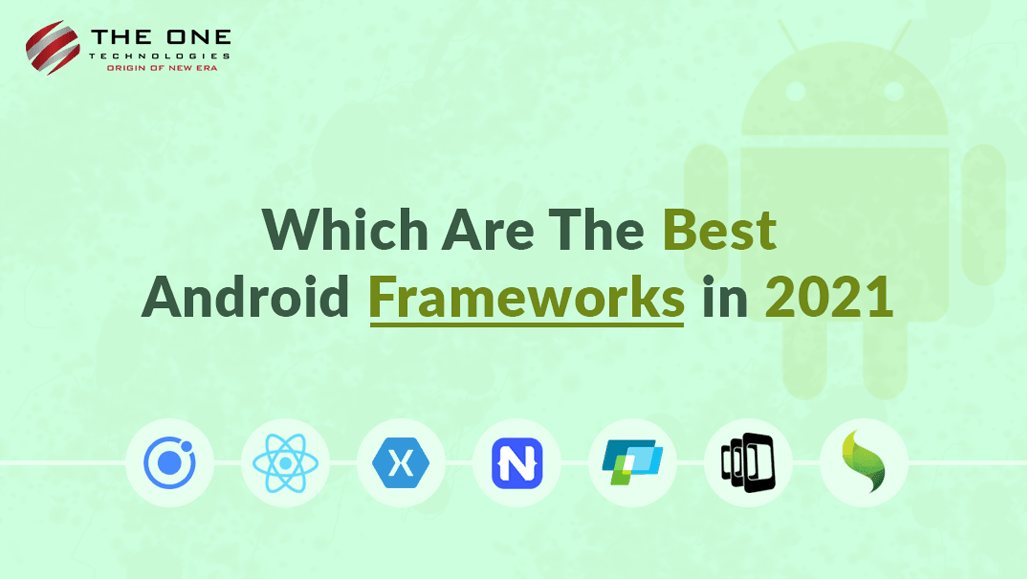Which Are The Best Android Frameworks in 2021?

With a whopping user base of 2 billion people and near to 1.5 billion downloads every month, Android has taken its number spot for mobile operating systems. So, whenever there’s a battle between Android and iOS app development, Android also wins the battle by providing several Android app development frameworks.
If you are looking to develop customized apps, Android is considered the most preferred platform. Android offers an ample of Android app development frameworks that empower developers to develop apps in a short time - even without having to code.
So, you must be wondering, what are these frameworks?
Do you wish to know which are the best frameworks to develop the Android app?
As a top-notch Android app development company, we are coming up with the best Android app frameworks which might help developers to develop apps very quickly.-
Happy reading!
Best Android Frameworks For Android App Development
Table of Contents:
1. Ionic

Ionic is free and open-source Android development tools that help developers to develop and deploy native apps using web technologies like HTML5, CSS3, and JavaScript.
Using the Ionic framework, developers can easily develop hybrid and interactive mobile apps for their customers. It’s the most developer-friendly framework, having a rich toolset of elements, gestures, and animations. This allows developers to develop high-quality mobile apps, desktop apps, and PWAs from a single codebase.
It lets you view and manage all the Ionic apps in one main, shared dashboard having live activity modules for seeing how the development process is progressing.
Features:
- Many APIs
- PWA support
- Virtual DOM, JSX, TypeScript Integration
- Third-party tools
- Cordova Plugins
- High performance
2. React Native

React Native is an open-source mobile framework that was developed and launched by Facebook in 2015. It allows you to use the React framework along with its native capabilities for developing mobile - Android, and iOS, and Web applications.
React Native makes use of the same UI building blocks that you use while developing an Android app. What developers love about React Native is that it uses Java or Swift or Objective-C programming language for Android app development.
Many organizations and developers have adopted this framework because of its constant support for IDEs, third-party plugins, and development tools, etc. Therefore, many big companies like Tesla, Instagram, Walmart, Baidu have been using this framework to develop their apps for different platforms such as iOS, Android, UWP, and Web.
React Native uses native platform-based interface components and APIs that are built-in for including a natural look and feel. It gives you proper solutions like codebase differences, imperative programming and iteration period.
Features:
- Write once and use everywhere
- Live reload
- NMP for installation
- Quick development time
- Third-party libraries
- UI focused
3. Flutter
Flutter is a free and open-source mobile UI SDK framework developed by Google, which allows developers to develop unique apps compared to other frameworks.
It’s preferable for hybrid app development, as it uses a single codebase. It allows developers to test, perform UI, unit and functionality testing without having any errors. The hot reload feature of its, is used for continuous testing without restarting the application.
Due to its multi-platform development process, developers can easily develop native interfaces on Android and iOS devices quickly. Flutter is written in the Dart language and works with existing code to help developers in mobile app development.
Features:
- Screen reader
- Faster development cycle
- Quick rendering
- Themes for Android and iOS
4. Native Android
The Native Android SDK offers API libraries and developers tools necessary to build, test, and debug quality apps for the Android platform.
Developers who are willing to build apps in native code using C & C++ will choose Native Android. It provides full flexibility in developing innovative and amazing apps and games for mobile devices.
Features:
- Java framework APIs
- Beautiful and intuitive native UIs
- Android development MVC
- Android community Stackoverflow
5. Xamarin

Xamarin is one of the open-source and cross-platform to build modern apps for iOS, Android, and Windows with the .NET framework. It allows developers to develop a native app with a single C# codebase for every key mobile operating system.
With a friendly development environment, it allows developers to develop native apps, having a code written in C# or XAML. You can use the same language, IDE, and APIs on every platform.
Whatever you do in Swift, Objective-C or Java framework, you can do the same thing in C# with Xamarin. It also allows you to test your app’s functionality which is only allowed on the cloud with timely monitoring of your app.
Features:
- Model-View-ViewModel
- Xamarin Forms, Android Designer, Visual Studio
- Stackoverflow, Xamarin Community Forums
- Standards-based and rich UI components
6. NativeScript

NativeScript is another great choice to accelerate your mobile app development. It’s one of the famous and listed frameworks for hybrid app development. Using NativeScript, you can develop JavaScript, Angular, and TypeScript apps.
It’s an open-source framework, which helps developers to develop native apps with Angular, Vue.js, TypeScript, or JavaScript while sharing the app code across platforms.
Features:
- Composable MVVM
- CLI, VS Code, Sidekicks, Plugins
- JavaScript API
- Stack Overflow, Slack, Github
7. jQuery

jQuery is a touch-optimized mobile app development framework. It's an HTML5 based user interface system, creating responsive apps which can be accessible on mobile devices or tablets.
It’s compatible with other mobile app development frameworks like PhoneGap and Worklight. Therefore, developers can develop custom theme based applications for Android, iOS, Blackberry, WebOS, and Symbian operating systems. It’s easy to learn and is quite similar to jQuery syntax.
Features:
- Corporate Design, Widgets
- Seriously cross-platform with HTML5
- jQuery UI provides touch-friendly form Inputs and UI Widgets
- jQuery Support Forum, jQuery Meetups
8. Corona SDK
Corona SDK is a software development kit allowing developers to develop mobile apps for Android. It’s a cross-platform framework that enables developers to develop 2D games and mobile apps. It uses Lua scripting language, incorporates more than 1000 built-in APIs, many plugins, and Corona Native extensions that help you make your app development a reality.
With the help of Lua, a lightweight, easy-to-learn multi-paradigm programming language, you can develop your dream app which focuses on speed, portability and extensibility. It allows developers to build a project 10 times faster than other mobile app development platforms and enables them to deploy on various devices including phones, tablets, and TVs.
Even if you update the code, you can see the changes in your app and publish them across major platforms.
Features:
- Minimum log
- Single code
- Easy to learn and use
- Amazing plugins
- Interactive Corona Simulator, Drag and Drop GUI
9. Adobe PhoneGap

Adobe PhoneGap framework is an open-source Android app framework introduced by Apache Cordova. It uses standards-based web technologies such as HTML, CSS, JavaScript, which gives the best performance, enabling mobile app developers to build apps that, too, without facing any hardware restrictions. It allows developers to build an app within a few minutes.
While these frameworks reduce the efforts and burden of mobile app development, we still recommend hiring a suitable and experienced mobile app development company that would give you better results.
Features:
- Strong and robust backend
- Open source
- Flexibility
- Connect your devices with the custom mobile app
- Ease of development
- Put your app in the cloud
- No SDK maintenance required
10. Sencha Touch

Sencha Touch is one of the best and most advanced Android frameworks to develop Android applications. It constructs JavaScript and Java systems that enable developers to configure, create, and test Android apps. It supports HTML5, CSS3, and JavaScript.
Sencha Touch is used to build universal applications. It encourages hardware acceleration techniques for better and higher performance grades. Sencha Test supports testing of ExtAngular, ExtReact, and React applications.
Features:
- Extensible API
- Open-source
- UI Component library
- Powered by the foundation of Ext JS
- Supports PhoneGap, animation and enhanced touch events like tap, double-tap, swipe, pinch and rotate
- Provides pixel-perfect, cross-browser fidelity
Conclusion
Well, the number doesn’t end here. You will find plenty of mobile application development frameworks for Android app development. In nutshell, when it comes to choosing the best Android app development framework, the sky’s the limit.
As a matter of fact, there are many new frameworks that are coming into the market every month. Nevertheless, as the best Android app development company, we have figured out the best Android frameworks in 2021. Although it’s completely your choice which framework to choose from. So, next time you worry about mobile app development, make sure to make the best out of it. Make sure you explore the different Android frameworks to enhance your mobile app development experience.









